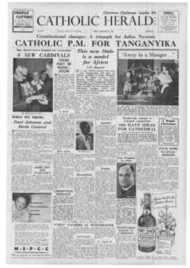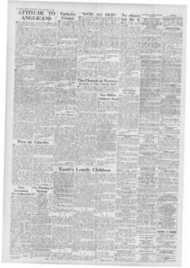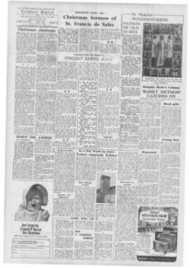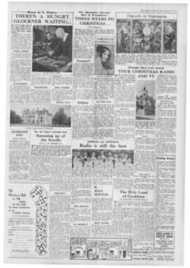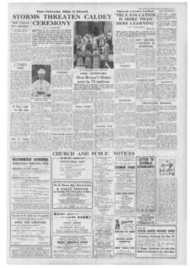Page 1, 18th December 1959
Page 1
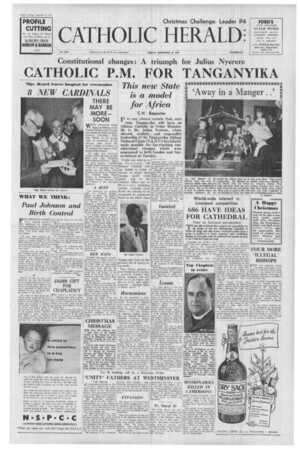
Report an error
Noticed an error on this page?If you've noticed an error in this article please click here to report it.
Tags
Share
Related articles
Nyerere For President
'freedom And Work' In Tanganyika
`mission Schools Are Safe'
Moslem-christian Peace?
'we Don't Want A Balkanised East Africa'
Constitutional changes : A triumph for Julius Nyerere
CATHOLIC P.M. FOR TANGANYIKA
This new State is a model for Africa
1CH.' Reporter IT is now almost certain that, next year, Tanganyika will have an African Catholic as Prime Minister. He is Mr. Julius Nyerere, whose shrewd, realistic and responsible leadership of the Tanganyika Mikan National Union (T.A.N.U.) has largely made possible the far-reaching constitutional changes which were announced in both London and Dares-Salaam on Tuesday.
Credit, too, must go to the Governor,' Sir Richard Turnbull, who has helped to foster a climate in which these changes could come about, and to the Colonial Office and its Minister s (including another Catholic—Lord Perth) for refusing to be stampeded by arguments based on the effects these changes may have on the political life of Kenya to the north.
These reforms represent a great triumph for Mr. Nyerere, a practising Catholic who, barring accidents. will now head one of the biggest—and also one of the most underdeveloped — emergent States in British Africa.
Harmonious
He has succeeded in maintaining harmonious relations not merely between the different racial groups of the country — there are 75,000 Asians and 25,000 Europeans to 9,000,000 Africans — but also between the opposing religious groups: there are 2.000,000 Moslems to 2,000,000 Christians (mostly Catholic) and, as Nyerere says, "5.000,000 uncommitted."
For the general elections to be held in the territory next year, the franchise is to be broadened to include probably over 1,500,000 men and women on a common roll. whereas only about 60,000 people —half of them non-Africansvoted at the last election.
The qualifications for voters are: simple literacy in English or Kiswahili (the Bantu language that has become the territory's lingua franca); or an annual income of £75; or holding or having held a prescribed office. There are also the normal qualifications of age and residence in the territory, and in addition all voters at present on the electoral roll will be automatically transferred to the new rolls.
The new legislative council will have 71 members: 50 of these will represent "open" seats. while the Asian and European minorities will be represented by II and 10 "reserved" seats respectively.
Although the situation is not inherently so explosive as, say, in Kenya or the Central African Federation, this should not be made an excuse for belittling Mr. Nyerere's achievements. The first elections to the Legislative Council were made on a racial basis, with 10 seats reserved for each of the three races: not only did T,A.N.U. win all 10 African seats but T.A.N.th-supported candidates won the Asian and European seats as well, and all three races cooperate harmoniously in the Elected Members' Association.
Insisted
It is illuminating that, when this association submitted its suggestions for constitutional reform. it was the Africans who insisted on the reservation of seats for Asians and Europeans: the latter members were quite prepared to have no such safeguards. Such mutual trust is, alas. all too rare in "multiracial" Africa.
Another revealine incident in Mr. Nyerere's career occurred when Sir Richard Turnbull was newly appointed as Governor in July. 1958. Mr. Nyerere was under a charge of sedition at the time. and he was convicted and sentenced to a fine with the alternative of imprisonment.
He chose to pay the fine because, as he said, he wanted to give the new Governor "a chance to start without embarrassment." It would have been fatally easy to have gone to prison and become a martyr to the cause of African nationalism in the tradition of Dr. Kwame N krumah.
What effects on the neighbouring territories of Africa will he caused by the development of Tanganyika as a multi-racial—or, rather, nonracial—State largely governed by Africans?
Lesson
The main lesson is that true multi-racial partnership can work in Africa, but that this needs good wifl arid tolerance on both sides. It is clear that the emergent politicians of Tanganyika have managed to break away from thinking in terms of group-stereotypes — "Africans," Asians." "Europeans." "Whites," "Blacks" — and have started in thinking in terms of individual human beings, which is essential if multi-racial partnership is to be anything other than an uneasy truce between fundamentally hostile communities who happen, by the accidents of history, to be occupying the same portion of the earth's surface.
Tanganyika now has a great responsibility. This emergent State —the first in British East Africa to approach so close to democratic self-government—has the task of guiding Kenya to the north and the Central African Federation to the south towards overcoming the legacy of bitterness bequeathed by past inter-racial conflict.
If Mr. Nyerere succeeds (as he has every hope of doing) in guiding his country to complete independence and ruling it without any of the strong-arm methods that Dr. Nkrumah has been forced to adopt in his attempt to weld Ghana together as a 20th-century nationstate. then the extremists on both sides in Kenya and Central Africa will be left with no excuse for their intransigent attitudes.
blog comments powered by Disqus


